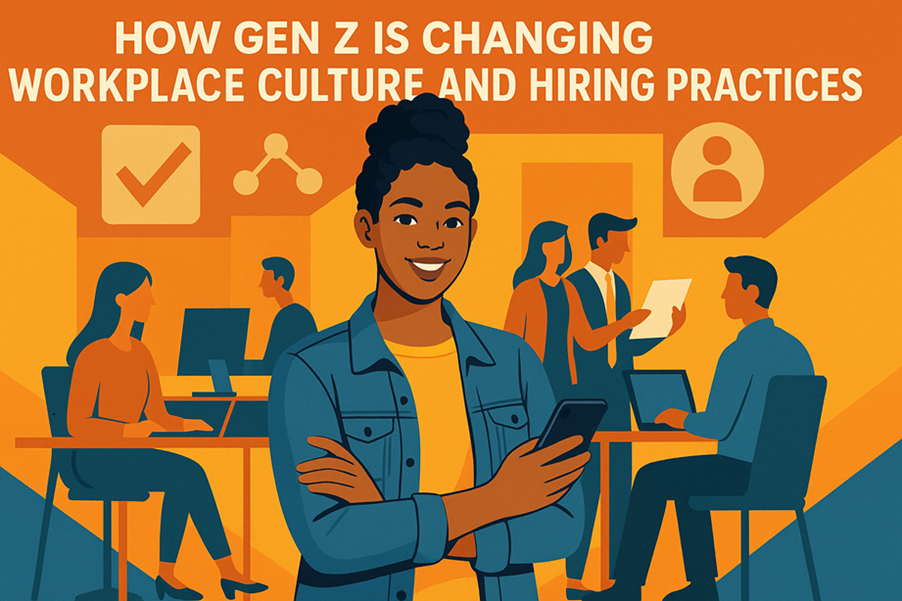Generation Z — workers born between 1997 and 2012 — are no longer the “future of work.” They’re the present. And as they increasingly populate entry-level roles and early-career positions, their influence is transforming workplace culture, expectations, and even the way companies hire.
With nearly 30% of the workforce projected to be Gen Z by 2030 [1], employers must adapt quickly or risk being left behind in the competition for talent. From communication styles to DEI values, remote work preferences to mental health priorities, Gen Z is redefining what it means to be an employee in the 2020s.
Gen Z’s Workplace Expectations: Values-Driven and Human-Centric
Gen Z places a premium on authenticity, purpose, and well-being. Gen Z job seekers are placing a greater emphasis on finding employers whose values align with their own — prioritizing purpose, ethics, and culture alongside compensation.
Key traits Gen Z expects from employers:
- Transparency and honesty in leadership
- Diversity, equity, and inclusion (DEI) as core—not performative—values
- Work-life balance and flexible hours
- Mental health support and wellness initiatives
- Opportunities for continuous learning and growth
According to a 2023 Deloitte survey, 46% of Gen Zs say they feel stressed or anxious most of the time — and 44% have rejected job offers or assignments based on personal ethics [2]. To effectively engage Gen Z talent, employers are increasingly recognizing the importance of supporting emotional well-being and fostering a socially connected workplace.
How Hiring Practices Are Evolving
Hiring practices are shifting in direct response to Gen Z’s digital fluency and desire for meaningful engagement.
1. More Humanized Candidate Experiences
Companies are ditching rigid, one-way interviews and embracing more collaborative, conversational formats. Gen Z values empathy and connection over formal process — and that extends to how they’re interviewed.
2. Social Media Recruiting
Platforms like TikTok, Instagram, and LinkedIn are now core tools for outreach. A recent study found 48% of Gen Z job seekers have applied for jobs they saw on social media [3]. Short-form videos and real stories from employees outperform generic career pages.
3. Skills Over Degrees
In line with broader workforce trends, Gen Z’s preference for skills-based hiring is prompting many employers to remove college degree requirements. Google, Tesla, and IBM are just a few major firms that now focus on demonstrated skills over formal education [4].
Remote Work Remains a Top Priority
Gen Z is the first fully digital-native generation, and remote or hybrid work isn’t a perk — it’s an expectation. Flexibility ranks among their top priorities when choosing an employer.
Even in traditionally office-based industries like finance and architecture, companies are now offering hybrid structures to remain competitive with Gen Z talent. According to McKinsey, 71% of Gen Z workers prefer a hybrid work model, compared to 63% of Millennials [5].
Gen Z and the Culture Shift
Gen Z tends to speak up about what matters to them, advocating for accountability and cultural alignment in the workplace.
This has led to broader cultural shifts in the workplace:
- Mental Health is Mainstream: Employee Assistance Programs (EAPs), mental health days, and open conversations about burnout are becoming standard.
- Two-Way Feedback: Gen Z expects to give feedback as much as they receive it — and they want leaders who listen.
- Fewer Hierarchies: Flat management structures are increasingly attractive to younger workers who value collaboration and transparency.
How DAVRON Sees Gen Z in Architecture, Engineering, Construction, and Manufacturing
At DAVRON, we’ve seen firsthand how Gen Z is already impacting the engineering, architecture, construction, and manufacturing sectors.
- They care about sustainability — and want to work on projects that improve communities and protect the planet.
- They seek mentorship, not micromanagement.
- They challenge traditional “boots on the ground” thinking with interest in remote collaboration, automation, and digital design tools.
Organizations looking to engage the next generation of professionals are increasingly focusing on initiatives like career development, DEI support, and digital workplace innovation.
A Generation Worth Adapting To
Gen Z is looking for workplaces that offer meaning, mutual respect, and flexibility — values they consider essential in today’s evolving job market. Employers who listen will benefit from a tech-savvy, driven, and socially conscious workforce that is poised to lead the future.
Want help attracting and retaining Gen Z talent in technical roles? DAVRON’s recruiting expertise can help you build the next generation of engineers, architects, and construction leaders — and understand how to keep them.
Sources
[1] Pew Research Center – Gen Z and the Future Workforce
https://www.pewresearch.org/social-trends/2023/05/11/gen-z-and-the-future-of-work/
[2] Deloitte – 2023 Gen Z and Millennial Survey
https://www2.deloitte.com/global/en/pages/about-deloitte/articles/genzmillennialsurvey.html
[3] Yello – Gen Z Job Search Behavior
https://yello.co/blog/gen-z-job-search-statistics-recruiting-strategies/
[4] CNBC – These major companies no longer require a degree
https://www.cnbc.com/2023/06/15/major-companies-no-degree-required-hiring-trends.html
[5] McKinsey – The hybrid workplace and Gen Z
https://www.mckinsey.com/featured-insights/the-future-of-work/the-hybrid-work-era-and-the-next-generation

